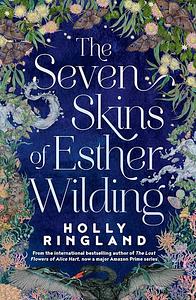Take a photo of a barcode or cover
adventurous
dark
emotional
inspiring
mysterious
reflective
medium-paced
Plot or Character Driven:
Character
Strong character development:
Yes
Loveable characters:
Complicated
Flaws of characters a main focus:
Yes
Yikes. Super disappointed. The lost flowers of Alice Hart is one of my favorites books. The seven skins of Esther wildling could have been half the length and the maybe I would have enjoyed the story. But it was just sooo drawn out.
adventurous
emotional
hopeful
inspiring
reflective
slow-paced
Plot or Character Driven:
Character
Strong character development:
Yes
Loveable characters:
Yes
Flaws of characters a main focus:
Yes
emotional
hopeful
inspiring
reflective
sad
medium-paced
Plot or Character Driven:
Character
Strong character development:
Yes
Loveable characters:
Yes
Diverse cast of characters:
Yes
Flaws of characters a main focus:
Yes
DNF around the halfway mark. This was so beautifully written, and so rich in colour and imagery, but just really struggled to get into the storyline.
adventurous
challenging
dark
emotional
funny
hopeful
informative
inspiring
mysterious
reflective
relaxing
sad
medium-paced
Plot or Character Driven:
A mix
Strong character development:
Yes
Loveable characters:
Yes
Diverse cast of characters:
Yes
Flaws of characters a main focus:
Yes
The second book I have read by Holy Ringland, each of them brilliant. Highly recommended x
adventurous
emotional
hopeful
mysterious
sad
slow-paced
Plot or Character Driven:
Plot
Strong character development:
Complicated
Loveable characters:
Yes
Diverse cast of characters:
Yes
Flaws of characters a main focus:
No
I was so excited for this book. The Lost Flowers of Alice Hart was one of my absolute favorites, so when a work colleague (Hi Greta!!!) recommended this book, I was SO EXCITED to read something equally beautiful, emotional, and immersive. And while The Seven Skins of Esther Wilding definitely had its moments, it just didn’t hit the same. Instead of feeling swept away in the story, I felt like I was wading through a whole lot of words, waiting to actually feel something.
The premise is great: Esther’s sister, Aura, disappeared into the ocean, leaving behind nothing but her journal filled with seven cryptic lines of poetry. Esther embarks on a journey to figure out what it all means, which takes her from Tasmania to Copenhagen to the Faroe Islands, all while she’s deep in her grief spiral - pushing people away, making bad choices, and generally being pretty difficult to be around. There’s a strong foundation here: themes of sisterhood, loss, mythology, self-discovery. It should have been powerful. But something about the execution made it feel more like work than an emotionally engaging read.
Key Strengths & What Worked:
The premise is great: Esther’s sister, Aura, disappeared into the ocean, leaving behind nothing but her journal filled with seven cryptic lines of poetry. Esther embarks on a journey to figure out what it all means, which takes her from Tasmania to Copenhagen to the Faroe Islands, all while she’s deep in her grief spiral - pushing people away, making bad choices, and generally being pretty difficult to be around. There’s a strong foundation here: themes of sisterhood, loss, mythology, self-discovery. It should have been powerful. But something about the execution made it feel more like work than an emotionally engaging read.
Key Strengths & What Worked:
- The settings were stunning – Holly Ringland’s ability to create vivid, atmospheric places is *chef’s kiss*. Copenhagen and the Faroe Islands felt magical, and I was shocked to read in the author’s note that she never actually traveled there. The research and detail put into making these places feel alive were seriously impressive.
- The exploration of grief – This is where the book shines. The way it tackles mourning, trauma, and the process of healing was raw and nuanced. Grief is messy and complicated, and the book doesn’t try to wrap it up neatly, which I appreciate.
- The folklore tie-ins – The use of selkie mythology and other Scandinavian folklore to mirror Esther’s emotional journey was a great concept. The idea of shedding skins, of transformation, of reclaiming yourself - it’s a strong metaphor.
- The female friendships – One of the best parts of the book was seeing women supporting women. The moments where Esther is surrounded by strong, caring female figures were some of my favorites, and I wish we got more of that.
Key Weaknesses & What Didn't Work
- The length. Oh my god, the length. – This book is 549 pages. And you feel every single one of them. There are entire sections that could have been cut without losing anything important. By the end, I found myself skimming through descriptions of every single song playing at a party, every little piece of scenery, every memory someone had. The over - explaining and excess detail made it exhausting.
- Esther was frustratingly unlikeable – Look, I don’t need a main character to be likable, but I do need something to latch onto. Esther spends most of the book being miserable, lashing out, and pushing away people who care about her. I understand that she’s grieving, but because we don’t really get much about who she was before Aura’s death, she just comes across as bitter and reckless. Her transformation at the end felt too little, too late.
- The romance subplot? Hard pass. – It was unnecessary and didn’t add anything meaningful to Esther’s story. If anything, it undercut her personal growth. We’re supposed to be seeing her reclaim herself, but then she’s also falling for a guy who conveniently shows up at just the right moment? Meh.
- The “mystery” was underwhelming – The whole book is structured around these seven lines of poetry, each supposedly revealing something important about Aura’s past. But by the time we got to the last few, they all felt kind of same-y. The reveals weren’t particularly surprising, and the pacing of the revelations felt like they happened when the plot needed them to rather than in an organic way.
Final Thoughts?
This book had all the right pieces - grief, sisterhood, mythology, stunning locations - but somehow, they didn’t come together in a way that fully worked for me. The themes were solid, and the writing was often beautiful, but it felt bloated, drawn out, and, at times, repetitive. If it had been a tighter, sharper story, I think I would have loved it a lot more.
It’s not a bad book by any means. There are some gorgeous moments, and I think people who love slow, lyrical, folklore-infused stories will get a lot out of it. But for me, it felt like too much of a slog to truly love it.
A beautifully written but overly long novel that doesn’t quite capture the magic of Alice Hart but still has something to offer.
Will I read more books by Holly Ringland? Absolutely.
Will I read more books by Holly Ringland? Absolutely.
adventurous
emotional
funny
hopeful
inspiring
reflective
sad
medium-paced
Strong character development:
Yes
Loveable characters:
Yes
Diverse cast of characters:
Yes
Graphic: Death, Miscarriage, Suicide, Grief, Pregnancy, Alcohol
Poignant, raw and a fabulous book. Ringland has captured the messy, unique and priceless nature of relationships, grief and courage in prose that pokes at the heart and resonates in your bones.
I found Esther, the character of the title, not very likeable in the beginning, until she began to let herself feel again after the death of her sister Aura. As each skin is peeled away, we glimpse more of Esther, and her family and relationships. With each chapter, it felt as though she could breathe easier, with her actions and the writing of her story becoming looser and lighter.
The plot had some unexpected twists to keep you turning the page, and the characters came and went, described with clarity and depth which made the whole story relatable and enjoyable reading. World building was well-researched and enough to put you in place without overwhelming the plot.
I loved the weaving of Pakana (Tasmanian Aboriginal) stories from Lutruwita, Tasmania, with mythology and tales from Copenhagen, Denmark, and the Faroe Islands. The strengths and creativity of women and their relationship with each other and the sea were brilliant.
Well worth the read.
I found Esther, the character of the title, not very likeable in the beginning, until she began to let herself feel again after the death of her sister Aura. As each skin is peeled away, we glimpse more of Esther, and her family and relationships. With each chapter, it felt as though she could breathe easier, with her actions and the writing of her story becoming looser and lighter.
The plot had some unexpected twists to keep you turning the page, and the characters came and went, described with clarity and depth which made the whole story relatable and enjoyable reading. World building was well-researched and enough to put you in place without overwhelming the plot.
I loved the weaving of Pakana (Tasmanian Aboriginal) stories from Lutruwita, Tasmania, with mythology and tales from Copenhagen, Denmark, and the Faroe Islands. The strengths and creativity of women and their relationship with each other and the sea were brilliant.
Well worth the read.
challenging
emotional
reflective
slow-paced
Plot or Character Driven:
Character
Strong character development:
Yes
Loveable characters:
Yes
Diverse cast of characters:
Yes
Flaws of characters a main focus:
Yes





